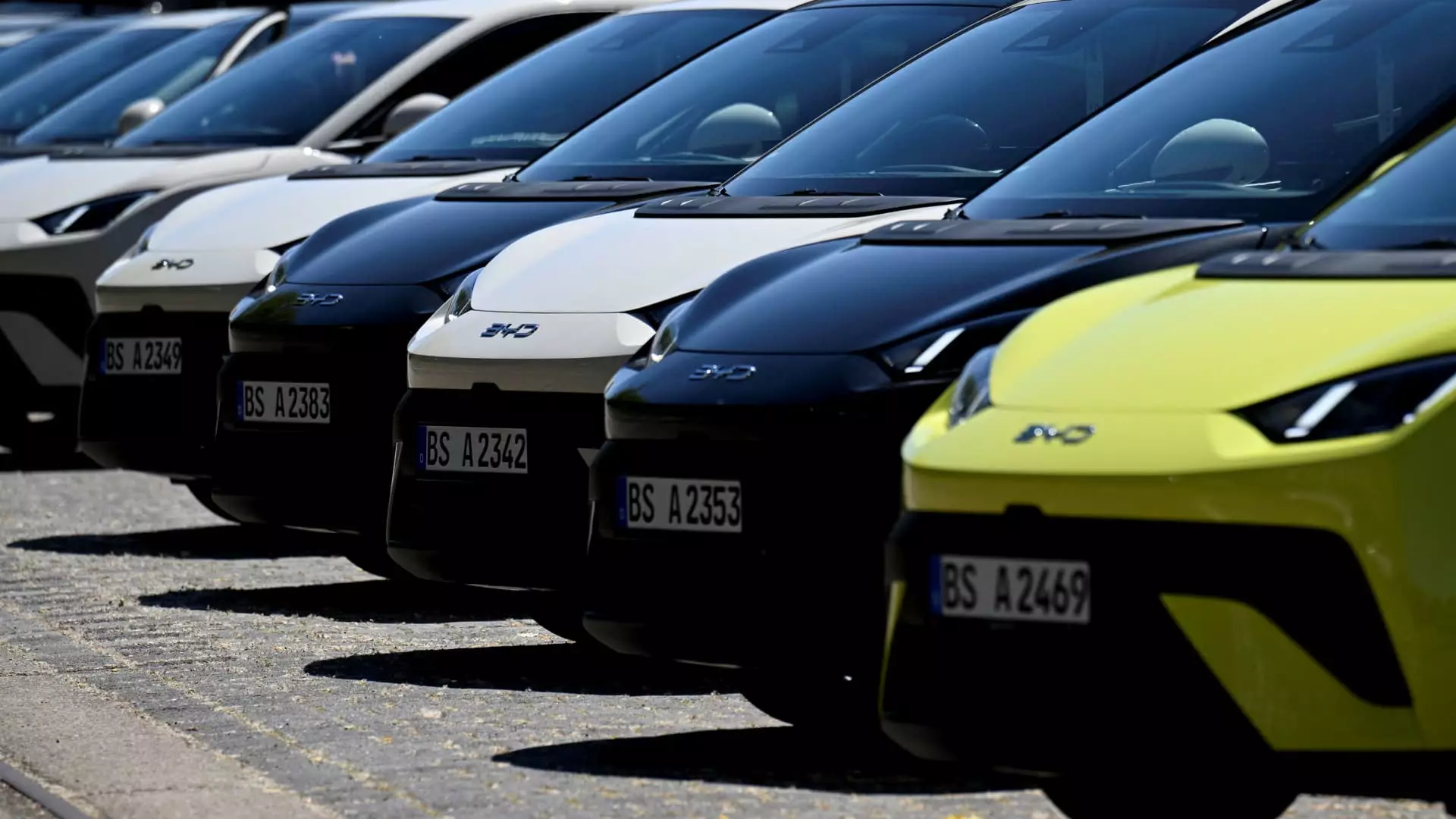The electric vehicle (EV) market in China is undergoing a seismic shift, driven by a fierce price war that has sent shockwaves through the industry. As companies vie for market share, the consequences are not just business-as-usual price adjustments; they are symbolic of deeper issues surrounding sustainability, consumer trust, and long-term viability. The urgency is palpable as Tesla, once the gold standard in EV sales, reported a staggering 15% drop in sales in May from the previous year, as per the China Passenger Car Association. This decline is a concerning indicator that even industry giants are not immune to the trials of an increasingly crowded marketplace.
In contrast, BYD, a significant player in the EV sector, celebrated a modest 14% increase in sales year-on-year, although it too had to resort to aggressive price cuts. The need for heavy discounts highlights just how fast-paced and precarious the market has become. It’s a vivid reminder that the race to the bottom can often mask deeper vulnerabilities—both for consumers who may end up with lesser products and for companies forced to sacrifice margins just to remain relevant.
Geely: The Dark Horse in the Race
Interestingly, Geely is emerging as an unexpected contender, deftly maneuvering through this tumultuous landscape. Analysts at CLSA have articulated their belief that Geely is truly “best positioned” among competitors. With multiple brands under its umbrella—Galaxy, Zeekr, and Lynk & Co.—the company benefits from shared technology and manufacturing efficiencies that allow it to offer better specifications at lower prices. This adaptability and focus on quality highlight a savvy strategy that contrasts sharply with the reckless price slashing seen elsewhere.
What’s noteworthy is the analyst projection that Geely’s pricing strategy could be the blueprint for future competitors. Rather than merely cutting costs to attract buyers, Geely is investing in creating better vehicle specifications that resonate with consumer desires for quality and features. This approach demonstrates that the best path to sustainable growth may not always be the most obvious or aggressive pricing tactics but rather a focus on product value.
Growing Stars and Declining Giants
Meanwhile, Xpeng represents an additional source of resilience amid turmoil. Recent reports reveal that the company, often overshadowed by Tesla and BYD, delivered over 30,000 vehicles in May alone, achieving consistent sales over seven months. The introduction of its lower-priced Mona brand could significantly shift its market positioning, appealing to more budget-conscious consumers looking for reliable EV options. Analysts are enthusiastic, raising their price target to reflect Xpeng’s potential market share gains.
Conversely, companies like Leapmotor and Li Auto are navigating their paths with relative stability but face uncertain futures. Leapmotor’s financial struggles—experiencing a net loss while trying to expand its product matrix—illustrate the perilous balancing act of growth versus expenditure. In contrast, Li Auto’s ability to maintain profitability, particularly with its innovative SUV models that combine gasoline and electric power, underscores a different aspect of consumer sentiment: the desire for practicality in the rapidly evolving EV landscape.
The Perils of Short-Term Gains
What is particularly alarming is the potential long-term implications of the current price war. As companies indiscriminately slash prices, could this not only destabilize their financial future but also erode consumer trust? It takes years to build a brand synonymous with reliability and performance, but a price-cutting spree can tarnish that image in an instant. Furthermore, companies like BYD, despite their optimistic expansions into overseas markets, may be risking a backlash; consumers around the world might become wary of cheap, low-quality EV options flooding their markets.
JPMorgan’s recent analyses note that although European sentiment toward BYD remains cautiously optimistic, the increasing flood of inexpensive vehicles has raised alarms about quality and safety standards. It leaves one questioning whether short-term sales boosts are worth the potential long-term damage to brand equity and consumer trust.
A Market on the Edge
The crisis extends beyond individual companies; it signals a call to action for the industry as a whole. The warning signs are becoming impossible to ignore, with production capacity vastly exceeding demand, resulting in a chaotic marketplace with excess supply. Macquarie analysts suggest that either the demand must increase significantly, or we are likely to witness a consolidation phase that could eliminate some players altogether. This precarious balance raises philosophical questions regarding the ethics and sustainability of such aggressive competition.
In a market characterized by innovation and speed, is the race for lower prices truly sustainable? Does it encourage a culture of responsibility, or will it erode the very principles of growth and advancement that EV innovations were supposed to embody?

